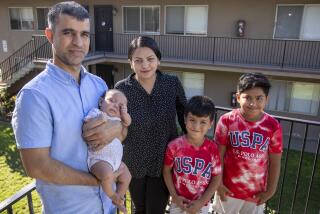Political Maverick Bows to Muslim Custom
- Share via
LONDON — An English governess taught her to sit up straight. Her lessons in literature and history were taken at Anglican boarding schools. She bought her clothes at Saks Fifth Avenue.
She imbibed liberal political ideals at Harvard and Oxford universities and became a powerful symbol of progressive reform for millions of people in her native Pakistan, a staunchly Muslim nation that has embraced Islamic fundamentalism.
Yet Benazir Bhutto, 34, who many believe is destined to become the Muslim world’s first woman prime minister, has bowed to tradition by accepting an arranged marriage to a man she met only after the deal had been struck.
Her engagement to a 34-year-old Karachi businessman Asif Zardari, the son of a wealthy land-owning family in Bhutto’s home province of Sind, was announced last week in London. The match was arranged under the direction of Bhutto’s mother, Begum Nusrat Bhutto, over a period of several months. Other family members were also involved in the negotiations--but not Benazir.
Her Father’s Death
Benazir Bhutto, who rose to political prominence after her father, Zulfikar Ali Bhutto, Pakistan’s first popularly elected prime minister, was hanged eight years ago, has consistently pressed for a greater role for women. Because of this, her acceptance of an arranged marriage has raised eyebrows among Western friends.
“I don’t really expect people in the West to understand,” she said. She said that she had had no real desire or intention to marry but eventually acquiesced to her family’s wishes. “Every mother wants her daughter married, and I felt obligations to my family and to my religion.”
Dressed in an elegant Pakistani salwar-kameez, a flowing, knee-length shirt and tight trousers, and speaking in lilting, slightly accented Oxford English, Bhutto sat at the kitchen table of her sister’s fashionable London apartment and attempted to explain the apparent contradiction. At a discreet distance sat Zardari, the mustachioed stranger she is to marry next winter in Karachi.
Two Choices
She made it clear that she was never really free to marry for love. “For me,” she said, “the choice was not between a love marriage or an arranged marriage but between agreeing to this or not getting married at all.”
Bhutto’s dilemma reflects the constraints of political and social realities in a conservative Muslim nation like Pakistan, where women rarely play a public role. The strict formality and the chaperones present at all Bhutto’s dealings with her male colleagues are considered as much a political necessity as an accepted social norm for a single woman.
She rated as nil her chances of meeting an eligible bachelor on her own. “It isn’t like the West, where it is fairly easy for men and women to meet each other,” she said.
Although some Westernized Pakistani families permit their daughters to meet men unchaperoned, Bhutto’s unusually high public profile and the presence of political forces eager to discredit her with a gossip campaign made this impossible in her case, she said.
The idea of relaxing with a man informally, let alone dating, would have been as politically devastating for Bhutto as the trip to Bimini was for Gary Hart, the former Democratic presidential aspirant.
Once Bhutto was asked if she had danced with any of her friends at Oxford, and she replied, “Good Muslim girls don’t dance with foreign men.”
Jail and House Arrest
She might have added another factor that has reduced her chances of meeting a prospective husband: Her political opposition to the country’s military leadership has kept her in jail or under house arrest for nearly six of the last nine years.
Once married, Bhutto will still be chaperoned and will still be unable to relax with male colleagues, but she will have a bit more stature as a married woman and it would be harder to crank up the rumor mill against her. Married women command a greater degree of respect than single women in Pakistan.
The marriage negotiations were initiated by Zardari’s family. The bridegroom to be is said to have admired Benazir from afar and asked his parents to pursue the matter. “I’d been pressurized into settling down (previously), but I always found one excuse or another,” Bhutto said. “Even in this case, I think if Asif hadn’t been so persistent, maybe I would not be getting married.”
Bhutto made it clear that she could have vetoed in advance the idea of an arranged marriage, but once the deal was struck, it would have been virtually impossible for her to back out--it would have humiliated her family.
She met her fiance at a family gathering here two weeks ago, an experience she described as nerve-racking. “It was very awkward,” she said. “We both knew the meeting was for a purpose. I was embarrassed.”
The beginnings of rapport are evident now in their relationship, but the engagement period has its constraints. Photographs published since the announcement have shown the couple in various poses, but never touching.
When a British photographer, hoping for something approximating a cheek-to-cheek pose, suggested that they lean toward each other, Bhutto said coolly, “I will lean; he will remain upright.”
Like most Pakistani brides to be, Benazir will wear an engagement ring. Zardari has promised her a diamond-and-sapphire ring, with a matching bracelet; both pieces are still being made.
Political Ambitions
Bhutto left little doubt that marriage will put no constraints on her political ambitions.
“An arranged marriage may seem traditional, but what is not traditional is the fact I’m not abandoning my identity or my career,” she said. “If I had thought it might hurt my political career, I know I would never have taken this step. I would never have gotten married at any stage.
“I would have never sought personal happiness at the cost of my country. If people have given their lives for the cause of freedom and constitutional rule, then I surely could have sacrificed marriage and children.”
Bhutto’s comments come against the backdrop of four turbulent decades of Pakistani independence, including prolonged military rule, three wars with India and a bloody civil war that turned East Pakistan into the independent nation of Bangladesh.
Although her father was freely elected, he, too, jailed political foes and condoned widespread corruption before he was overthrown in a bloodless coup 10 years ago. The man who led the coup, Zia ul-Haq, who was then the army chief of staff, rules the country today.
The coup, followed by Zulfikar Ali Bhutto’s execution, fueled political hatred that still simmers, dividing the country; on one side are Zia, the military and religious-based institutions, and on the other is an amalgam of populist, secular opposition forces headed by Bhutto’s Pakistan People’s Party.
The crowds that greeted Benazir Bhutto 18 months ago when she returned from exile were interpreted as a direct challenge to Zia, and she has since pressed for early parliamentary elections, now scheduled for 1990.
During her university days, Benazir had planned a career in Pakistan’s diplomatic service, but the coup against her father turned her life upside down. She has two younger brothers and a younger sister, but her drive, her maturity and the magic Bhutto name thrust her forward as her father’s natural successor.
The intensity of politics on the volatile subcontinent, the power of family and her own tenacity have kept her in politics. Years of harassment, including exile, jail and extended periods of house arrest, seem only to have hardened her resolve to restore her father’s image and his populist policies.
Burden of Power
Bhutto is the youngest in a small group of women leaders from prominent families who have carried the burden of political power in a part of the world where women have traditionally remained at home.
Sirimavo Bandaranaike of Sri Lanka became the modern world’s first woman prime minister in 1960, replacing her husband, who was assassinated the previous year.
In India, political power brokers settled on the shy, politically inexperienced Indira Gandhi, the daughter of Jawaharlal Nehru, as a compromise prime minister in 1966. She went on to dominate her nation and South Asia for the better part of a generation, until she was assassinated by Sikh bodyguards in 1984.
And in Bangladesh, Hasina Wazed, the 39-year-old daughter of the country’s murdered first president, Sheik Mujibur Rahman, now leads the opposition to Lt. Gen. Hussein Mohammed Ershad’s government.
“We all started our political careers because of what had happened to a loved one,” Bhutto said before returning to Pakistan on Thursday. “But having that initial first start, there is also the concept in the East of the woman being very natural and emotionally strong. Women may not have the same life they enjoy in the West, but the concept of the mother or sister is respected and revered, and that has helped us politically.”
Bhutto said her political drive faltered only once, last year after her brother Shahnawaz died of poison in France. She chastised herself for not devoting herself more completely to her family and questioned the value of her political activism.
“I wondered what I was doing, why I hadn’t spent more time with him, where it was all leading to. Then I returned home for his funeral and I saw the crowds. They made me realize I had to accept my responsibilities.”
Her marriage may be a political gain, if only marginally. She will lose some of the sympathy she gained as a young, single woman fighting her father’s cause so tenaciously, but the publicity surrounding the marriage will be positive, showing her in a human light. And Pakistanis love weddings, especially grand ones. Marriage will also give her an aura of maturity she could use in her quest for power.
Asked whether marriage might influence her immediate political plans, she said: “I feel I have to try to adjust both to my work and to my house and to having a husband to look after. Then if there are any problems, Asif will help me sort them out because he understands me as a person, what motivates me, what gives me satisfaction in life.”
His Business, Interests
For his part, Zardari said, he plans to carry on with his Karachi construction business and with his hobby, polo; he runs his own team, the Zardari Four. His family’s political leanings are said to have been checked carefully when the marriage was being negotiated, and Zardari says he has no personal political ambition.
“I think one member of the family in politics is good enough,” he said with a smile. “There is a lot to life outside that.”
Both Bhutto and her fiance want a family. “He wants sons,” Bhutto said. “I would like a daughter.”
More to Read
Sign up for Essential California
The most important California stories and recommendations in your inbox every morning.
You may occasionally receive promotional content from the Los Angeles Times.










